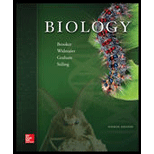
Concept explainers
Introduction: The two different modes of reproduction are sexual reproduction and asexual reproduction. The asexual reproduction involves the production of offspring with genes inherited from a single parent. The offspring is genotypically similar to the parent organism. The sexual reproduction involves the fusion of two haploid gametes to form a diploid zygote. Both the haploid gametes are from two different parents and the offspring is not an exact copy of a single parent.
Answer to Problem 1TY
Correct answer: The development of offspring from the unfertilized eggs is called parthenogenesis. Hence, the correct answer is option d.
Explanation of Solution
Reason for correct answer:
Parthenogenesis is the property of lower plants and invertebrates, such as insects, some spiders and amphibians. Even some birds reproduce by this method. In this type of reproduction, the egg produced is diploid and develops into a complete organism. This is also a type of asexual reproduction.
Option d. is given as “parthenogenesis”.
Parthenogenesis is the development of offspring from the unfertilized eggs. Hence, the correct answer is option d.
Reason for incorrect answer:
Option a. is given as “budding”.
Budding is a type of asexual reproduction, but this process does not involve the formation of an ovum. Instead, the new organism emerges out of the previously existing organism. Hence, option a. is incorrect.
Option b. is given as, “cloning”.
Cloning refer to the process of generation of genetically identical biological entity or cell. Hence, option b. is incorrect.
Option c. is given as “fragmentation”.
In this type of reproduction, the organism breaks into smaller fragments and each fragment is capable of developing into a complete individual. Hence, option c. is incorrect.
Option e. is given as, “implantation”.
Implantation is a type of sexual reproduction in which the egg is fertilized by sperm and the fertilized egg gets implanted in the wall of the uterus. Hence, option e. is incorrect.
Hence, the options a., b., c., and e. are incorrect.
The type of asexual reproduction in which the development of offspring takes place from unfertilized eggs is called parthenogenesis.
Want to see more full solutions like this?
Chapter 51 Solutions
Biology
- What are Clathrin coated vesicles and what is their function?arrow_forwardHow is a protein destined for the Endoplasmic Reticulum (ER), imported into the ER? Be concise.arrow_forwardFind out about the organisations and the movements aimed at the conservation of our natural resources. Eg Chipko movement and Greenpeace. Make a project report on such an organisation.arrow_forward
- What are biofertilizers and mention the significancearrow_forwardPCBs and River Otters: Otters in Washington State’s Green-Duwamish River have high levels of polychlorinated biphenyls (PCBs) in their livers. PCBs can bind to the estrogen receptors in animals and disrupt the endocrine system of these otters. The PCBs seem to increase the estrogen to androgen ratio, skewing the ratio toward too much estrogen. How would increased estrogen affect the river otter population? Based on your reading of the materials in this unit, what factors can affect fertility in humans? Explain how each of the factors affecting human fertility that you described can disrupt the human endocrine system to affect reproduction.arrow_forwardOther than oil and alcohol, are there other liquids you could compare to water (that are liquid at room temperature)? How is water unique compared to these other liquids? What follow-up experiment would you like to do, and how would you relate it to your life?arrow_forward
- Selection of Traits What adaptations do scavengers have for locating and feeding on prey? What adaptations do predators have for capturing and consuming prey?arrow_forwardCompetition Between Species What natural processes limit populations from growing too large? What are some resources organisms can compete over in their natural habitat?arrow_forwardSpecies Interactions Explain how predators, prey and scavengers interact. Explain whether predators and scavengers are necessary or beneficial for an ecosystem.arrow_forward
- magine that you are conducting research on fruit type and seed dispersal. You submitted a paper to a peer-reviewed journal that addresses the factors that impact fruit type and seed dispersal mechanisms in plants of Central America. The editor of the journal communicates that your paper may be published if you make ‘minor revisions’ to the document. Describe two characteristics that you would expect in seeds that are dispersed by the wind. Contrast this with what you would expect for seeds that are gathered, buried or eaten by animals, and explain why they are different. (Editor’s note: Providing this information in your discussion will help readers to consider the significance of the research).arrow_forwardWhat is the difference between Uniporters, Symporters and Antiporters? Which of these are examples of active transport?arrow_forwardWhat are coupled transporters?arrow_forward
 Concepts of BiologyBiologyISBN:9781938168116Author:Samantha Fowler, Rebecca Roush, James WisePublisher:OpenStax College
Concepts of BiologyBiologyISBN:9781938168116Author:Samantha Fowler, Rebecca Roush, James WisePublisher:OpenStax College Human Heredity: Principles and Issues (MindTap Co...BiologyISBN:9781305251052Author:Michael CummingsPublisher:Cengage Learning
Human Heredity: Principles and Issues (MindTap Co...BiologyISBN:9781305251052Author:Michael CummingsPublisher:Cengage Learning Biology (MindTap Course List)BiologyISBN:9781337392938Author:Eldra Solomon, Charles Martin, Diana W. Martin, Linda R. BergPublisher:Cengage Learning
Biology (MindTap Course List)BiologyISBN:9781337392938Author:Eldra Solomon, Charles Martin, Diana W. Martin, Linda R. BergPublisher:Cengage Learning
 Human Biology (MindTap Course List)BiologyISBN:9781305112100Author:Cecie Starr, Beverly McMillanPublisher:Cengage Learning
Human Biology (MindTap Course List)BiologyISBN:9781305112100Author:Cecie Starr, Beverly McMillanPublisher:Cengage Learning





